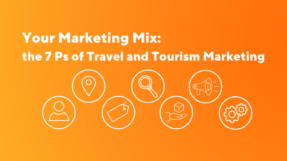Table of Contents
For many travelers, Online Travel Agencies (OTAs) are the preferred way to search for and book package deals, accommodation, flights, tours, and other travel. Online travel agents like Expedia, Hotels.com and Booking.com are among some of the most popular websites in the world.
For business-savvy tour operators who recognize that organic search engine traffic alone may not generate enough revenue, OTAs are an important component of a successful distribution channel strategy. They can help you reach many more travelers and generate more bookings. However, the advantages of OTAs need to be balanced with the disadvantages, like having to pay a commission on every booking.
To help you figure out the best plan of action, here’s a rundown of the pros and cons of online travel agents, and how you can use them to benefit your business.
What is an Online Travel Agency (OTA)?

An OTA is a one-stop online travel marketplace where travelers can search for, compare, and book everything from flights and hotels, to tours and car rentals.
Think of an OTA as an Amazon.com for travel. OTAs like GetYourGuide and Expedia attract millions of visitors every day because of their convenience, price and product comparison capabilities, and their huge range of hotels, tours, and other travel.
From an OTA’s perspective, the typical business model involves making money by taking a commission from each booking. Many also offer display advertising or charge companies a “pay-per-click” fee to ensure their listing appears at the top of relevant search results.
Advantages of Online Travel Agencies (OTAs)
Expand your reach

The main advantage of OTAs is their huge popularity, which enables tour operators to reach more travelers. It’s no secret why OTAs attract so many people:
- Breadth of choice: Just as consumers use Amazon for buyer research and price comparison purposes, OTAs offer a huge range of experiences and price points for travelers who are shopping for something specific or looking for ideas.
- Price comparison and deals: OTAs are also popular among price-conscious travelers and bargain hunters. They let people search for travel within a set budget, and weigh their options in one place—comparing different options side by side.
- Convenience and ease of use: Like other online retailers, OTAs are simply an easy and convenient way to shop compared to the offline equivalent. The ability to use filters to narrow down their selection according to their preferences makes OTAs an invaluable time-saving tool when researching travel.
Create marketing efficiencies
OTAs spend enormous amounts of money promoting their websites. If you have a limited marketing budget, it’s a cost-effective way to reach a much larger audience. Listing your tours on an OTA could also increase sales through your own website—a phenomenon known as the “billboard effect”.

Many savvy buyers use OTAs as a type of meta search engine (a search engine within a website that surfaces results from lots of different search engines). For example, a traveler searches for “things to do Waikiki” on Expedia. To explore their options and narrow down their preferences, they’ll skim through activities, read reviews, and compare pricing before switching over to Google. Now they have a better idea of what’s out there and what they’re interested in, so their search keywords will be very specific. For example, “Atlantis Submarines Waikiki.”
So how do you benefit from this buyer behavior and make sure your business takes advantage of the billboard effect on OTA websites?
- Have a strong direct pricing strategy. Consider all of your costs, including digital marketing, resellers commission, etc. to come up with a price that works for your audience, market, and business.
- Build a strong SEO and paid-search strategy so you show up prominently in search results.
- Protect your brand name with selective organic and paid keyword combinations.
- Thoroughly read through an OTA’s terms before signing on. Make sure you own your brand name in paid search.
Generate more low season bookings

If you experience a downturn in sales during the low season, listing your tours on an OTA lets you piggyback their marketing efforts—at a time when you may need to reduce your costs—to sell tours more quickly, easily, and cost-effectively (even factoring in commissions) than you might be able to do yourself.
Gain invaluable insights
When you list your tours on an OTA, you may receive access to the analytics and data insights generated by the platform. Carefully consider how to measure your customers’ buying patterns. You can test different pricing strategies and use the platform’s analytics to spot potential new trends and opportunities, or use these insights to make better-informed business decisions.
Done correctly, all of these things allow business-savvy tour operators to use OTAs as a valuable tool for direct business.
Disadvantages of Online Travel Agencies (OTAs)
Having to pay a commission
While listing on an OTA is free, OTAs make their money by charging a commission on every booking. This can be as much as 20% of the cost of the sale or even higher. Of course, this cost may be offset by selling more tours, faster.
Customer service issues and cancellation rules
One reason some travelers don’t like using OTAs is the customer service, or lack thereof. Post-sale, OTAs typically become the main contact for cancellation, booking changes, or issue resolution. If something goes wrong, such as a cancellation due to an unforeseen event, travelers can be left dealing with a large company and the impersonal and unsatisfying customer service that often goes along with that. This may also affect their impression of your business.
Risk of overbooking

Overbookings can be a common problem even if you don’t currently list on an OTA. You might already be taking bookings over the phone, at your office, on your website, and through resellers. Adding multiple online travel agents to the mix can create more work to manage overbooking your tours and activities. Doing it manually or using a number of different systems and processes can be unproductive, reducing the many benefits of selling through OTAs. The best solution for overbooking is a centralized booking system with a channel manager that lets you keep track of all your bookings.
Potential loss of business
It is actually possible to hurt revenues by using an OTA due to common OTA marketing strategies. For example, an OTA might favor some tour companies over others due to them receiving a higher commission. That means your business finds it more difficult to appear in searches, while a competitor appears prominently.
Loss of complete control
The moment you start using an OTA, you face limitations around how you can market your business on their site. This includes restrictions on how tour descriptions are presented, a limited ability to edit and update listings, and so on. The good news is that you can offset this potential disadvantage by connecting to an OTA via a centralized booking system that allows you full control over your content.
Examples of Online Travel Agencies (OTAs)
Ready to get started with OTAs? Here’s an online travel agency list to check out—from huge global brands selling everything from flights to vacation rentals and experiences, to smaller, more niche OTAs.
A leading booking site for the Asian market in particular, offering all types of travel bookings, especially accommodation.
Part of the Expedia Group, which owns multiple OTAs, also including Orbitz and Travelocity.
One of the largest OTAs for tours and activities in the world.
A growing OTA specializing in unique experiences, especially for millennial travelers.
A growing OTA focused on selling tickets to museums and other attractions, but that does list other local experiences.
All of these websites have a section explaining how they work with tour companies, what their commission is, and how to get started.
Already selling through OTAs? Integrate Rezgo with Expedia, Viator, and GetYourGuide to manage your availability and revenues in one place and ensure a smooth customer experience.
Editor’s Note – July 2022: Updated to reflect the current percentages charged by OTAs.





